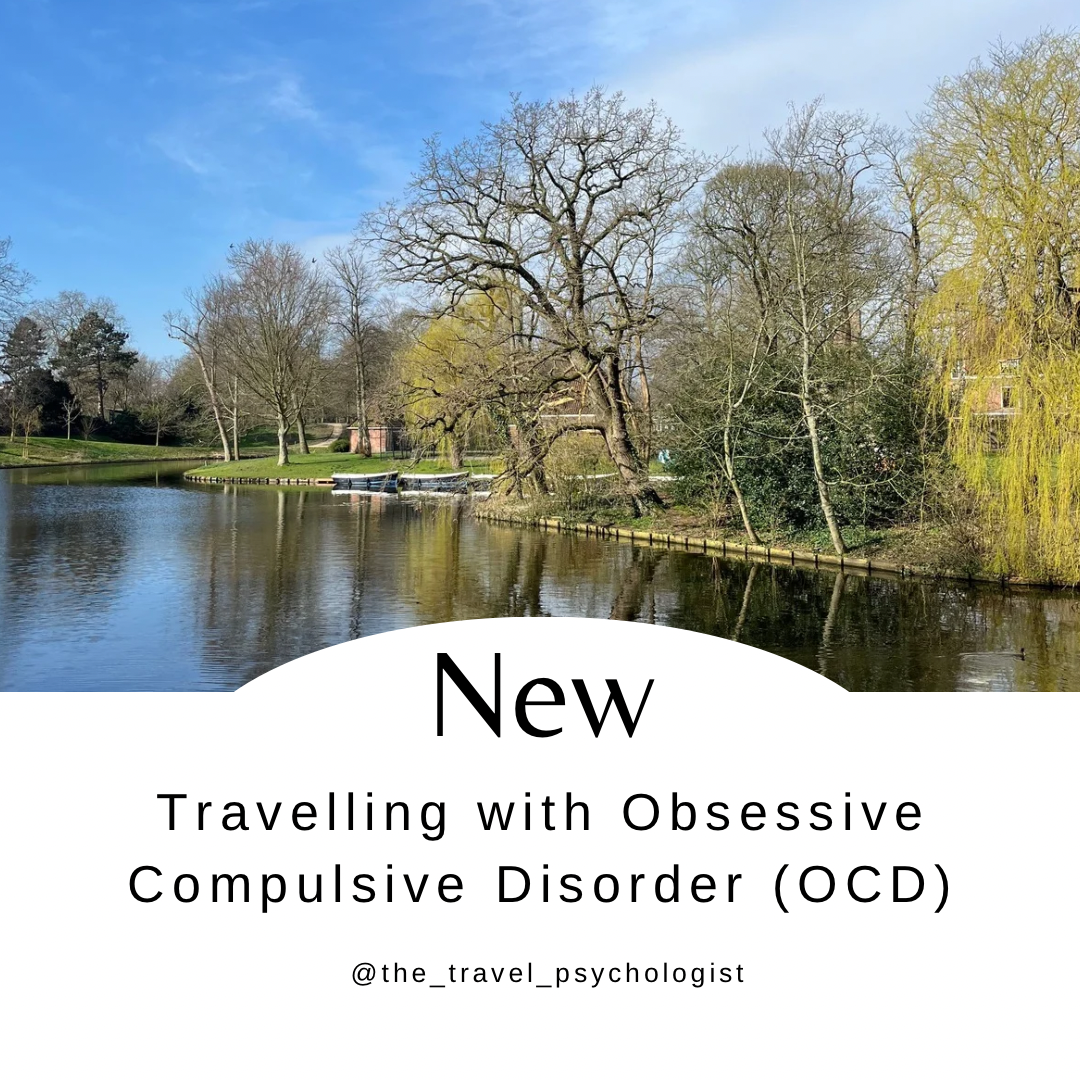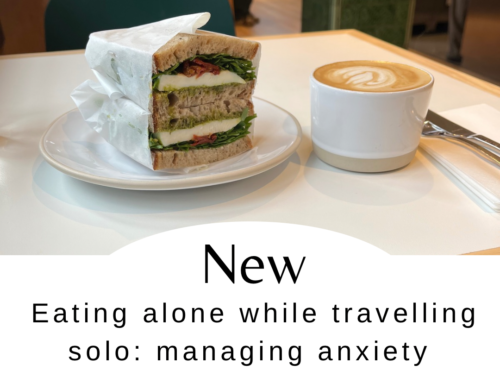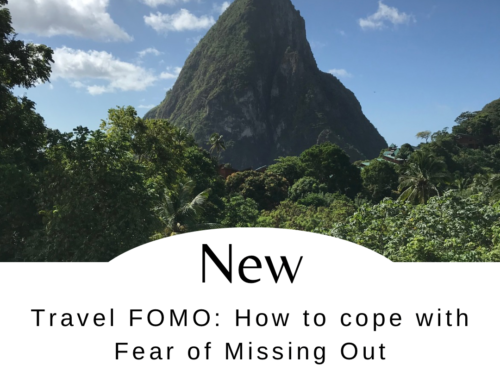Dr Victoria Ross, Clinical Psychologist & Guest Contributor
The hotly anticipated holiday of the year has arrived, you’ve packed your bags and are fully ready to kick back, leaving the stresses of everyday life, back home. Perhaps you had hoped that this time, even OCD might be so kind to give you a break to have a proper holiday. That this one time, you would get a breather from the incessant torment associated OCD. If only.
If you have lived with Obsessive Compulsive Disorder, better known as OCD for any amount of time you will know that OCD does not take holidays. In fact, it is quite the opposite. In my experience, many clients find that OCD symptoms worsen during holidays. So much so, many avoid taking holidays altogether.
It’s not all bad news, however. There are several ways to reduce the burden of OCD while travelling. Ways which can free you up to have a fulfilling and restful break, even with OCD in tow. In this article I will outline what happens to OCD when on holiday and provide my five top tips to help you cope while travelling.
What is OCD?
Let’s start with the basics around what OCD is as there are many misconceptions. The primary features of OCD are obsessions and compulsions:
Obsessions are unwelcome and distressing thoughts. They are intrusive, which means they pop into your mind without you trying to think about them. In my experience, those who suffer from OCD will experience a variety of themes in their intrusive thoughts. For example, you may experience fears about paedophilia, existential, contamination, harm, sexual, relationships, just right, somatic, real event. These are often very distressing thoughts that are unpleasant and cause you a lot of distress.
Compulsions are the things people do to try and manage the distress caused by the intrusive thoughts. They may be behaviours such as checking behaviours or rituals. They may also be internal, such as repeating a word or phrase in your head.
Many people who don’t have OCD understand that the condition can involve checking behaviours and rituals. It is less common for people to understand that this is a way to deal with very upsetting and disturbing thoughts. This lack of understanding can lead to comments like “I’m a bit OCD” if someone is very particular about cleaning, for example. These comments are inaccurate because true OCD often has a huge detrimental impact on someone’s life and goes well beyond being meticulous.
Why travelling with OCD is difficult
Travelling can be stressful for most people. Whether it be the last minute packing, traveling through airports, organising little people, language barriers or the endless decisions. Added to this, our usual structure, routine and coping mechanisms tend to promptly fall away. Therefore, travel can create a perfect storm for an increase in obsessive rumination, intrusive thoughts (thoughts, image, sensation, urge) and compulsions (mental or physical). We know that OCD will take up whatever space that is available to it, so this is both understandable and expected.
OCD operates in a sneaky and opportunistic way, often with many guises. As I outlined earlier, most people with OCD will experience various themes in the content of their intrusive thoughts. In my experience, this can change when people are travelling or when they go on a special trip. So, if you are familiar with paedophilia intrusions, then don’t be surprised if it switches to contamination or relationship-based intrusions with the headline “This one is new so it must be real”. It’s bit like a game of hungry hippos – you hit one down and before you know it, another pops up.

Tips for travelling with OCD
Preparation and connecting to values
Why are you going on holiday in the first place? What is your motivation? What do you want to get out of the holiday? Often it can be helpful to remind ourselves of the “why” behind the “what”. This is especially true when it comes to anxiety provoking situations. And in case of any doubt, travelling with OCD is exactly that.
My bet is that you are going travelling because in some way, it helps you connect with the person you want to be, and the life you want to live. Perhaps you want to expand your comfort zone and show yourself that you can do it. Being clear on your motivations can help you to get through some of the tough moments that you may face on your trip.
Your goals may be about experiencing different cultures, connection, adventure, novelty or exploration. Each of these is amazing for our wellbeing and personal growth. If this is your driver and then be clear about this and make it your mission to succeed.
On a more practical note, is there anything that you can you bring with you which can help your nervous system settle or increase feelings of safety? Perhaps a comfort item or something that reminds you of a person that you are close to. Another way to do this is to have photos on your phone to connect you to times when you have felt safe, soothed and connected. Or you can use visualisation or imagery to connect to a memory. This can help manage your level of threat in the body and mind. Remember, this is not to be a compulsive act to get rid of distress. Rather, a tool to help your body feel soothed, in the presence of OCD.
A new relationship to thinking
Our minds have a mind of their own. It’s true, every day the mind is constantly throwing out all sorts of thoughts and stories. Your mind creates a lot of noise. It’s how the mind works. If you go on holiday then it will be no different. Your mind wants attention and it wants you to engage. Often the hope is that you will find the magic answer to rid yourself of these unwanted thoughts and experiences. However, I encourage you to come back to the idea that rather than getting rid of, we change the way we relate to, and how we respond to OCD. After all, I assume you’ve tried various ways to get rid of OCD with little effect?
One way to do this is to name your OCD story. Now, this might sound a bit strange but bear with me. If you labelled your OCD, what would it be? The harm story? The humiliation story? The doubt story? Similarly, you can create a character out of your OCD. What would it look like if your OCD was an animal, cartoon or film character?
You are not your thoughts and your thoughts are not you. Yep, read that one again. Your inner experiences whether it be thoughts, sensations or urges are not a reflection of your identity or inner most desires. So hold your mind lightly, become a witness to your thoughts, sensations, urges rather than identifying with them. It’s like you are taking a helicopter perspective, looking down at what is happening in your mind rather than being caught up in the action. You might find it quite fascinating, or even amusing how weird some of the stuff that our brains comes up with. The job is to notice the thought and detach from meaning from it. There’s OCD doing its thing again…Thanks Mind… Here’s the harm story.
Believe it or not, there is research based on how these strategies can be helpful. Just to be clear, the job here is not to stop the thought. It is never to stop the thoughts. If any therapist has told you this, well, then you should leave.
For more on these strategies check out this self help guide to managing OCD from Mind
Ruling thoughts
When it comes to OCD what’s on the surface does not tell the full story. What is the core fear? I am a bad person, I am responsible, I am mad. These, combined with ruling thoughts get us hooked. The rules we hold about our thoughts lead us to compulsions. Compulsions are behaviours, either inside our mind or physical, that we do to respond to intrusions. What are the rules you hold about your thoughts. Some common examples below:
- I can’t handle it/ I can’t cope with it
- I need to know for sure
- I have to respond to every thought
- Because I think it, I have to do it
- If I have this thought, I am a bad person
- If I think a lot about this thought, it means it is important,
- I have to respond to every thought that pops into my mind
- Not responding to thoughts is causing harm to others.
- Not doing anything about the thought, is the same as causing it
- I think, therefore I am
- They feel scary, therefore it is scary
- I am responsible
The golden rule here is that thoughts and behaviour and different. So, although your OCD may tell you the above rules. I can wholeheartedly confirm that none of them are based on truth or wisdom of how our minds work.
Try your best to catch your ruling thoughts. Ask yourself ‘how do I want to respond to these when they show up?’
Values-based Exposure and Response Prevention (ERP)
OCD is a great trickster. Because of the rules, it can make you believe that you have no choice other than to check, count or wash one more time. This is the fuel of OCD. I need to call OCD out though as this is not true. It may feel like you don’t have a choice but the reality is that thoughts and behaviour while connected, are completely separate. You can have a thought or a feeling and do something different. You can take action that leads you toward your values and the person you want to be instead of away. Release from OCD lies in our actions and how we respond.
Values-based Exposure and Response Prevention (ERP) is a common way to treat OCD. It involves two steps: exposing to situations that trigger our obsessions AND resisting our usual responses i.e. compulsions. These practices should continue when you are on holiday. You may need to make some adjustments or think out of the box when not in your familiar surroundings. One thing is for sure though, if you are able to carry out ERP while on holiday, you are likely to get some relief. Watch out for the sneaky mental compulsions that are not always visible.
Consider how your wise self can make decisions around what you do. OCD will shout from the rooftops and dictate what you do or don’t do. This just adds to the problem. Even if you don’t feel like it, take action in line with your values. The more we learn to resist our compulsions, the quieter OCD will get and eventually, we will starve it of its power.
Tips for value based exposures:
- Use your values to guide your ERP – remembering your reason for travelling can help you to overcome compulsions
- Push the boundaries without overwhelming yourself
- Have response prevention message at the ready (Maybe I will get HIV, maybe I will not. It is possible. I am safe in the uncertainty)
- Detach from thoughts (I notice I am having the thought that I am a paedophile)
- Watch out for sneaky mental compulsions
Support
OCD can lead you to withdraw and disconnect from people around you. Or, it can lead you to stay close repeatedly seeking reassurance from people close to you– do you think I could be a paedophile? Did I make the right decision? Am I a bad person?
Instinctively, people close want to help and reassure you. However, this adds fuel to the fire. The relief will be temporary at best, and it will leave the OCD insatiable needing more.
Ideally we are able to connect with and talk to our travel companions but without over-relying on them for reassurance. The most helpful strategy is to be clear with someone about what they can do to support you, including what will be helpful and what isn’t helpful. It is best to have these conversations before you travel and when you are feeling calm. This is because none of us communicate well when we are stressed and tired!
Here are some examples of things that you might say
- When my OCD is taking over I usually get very quiet. At this time it might help if you try and distract me or talk to me about something I’m really interested in.
- When my OCD is taking over I might start asking you for a lot of reassurance. It can help if you speak softly and kindly and say something like “You’ve asked me not to repeatedly give reassurance so I’m not going to answer that question again. However I want you to know that I’m here for you”
- Give your travel companions some specific instructions of how to respond if they see you acting out rituals or compulsions. Would it help if they gently remind you that you are trying to reduce the compulsions? Would it help if they distract you? Could they remind you of your intention for the trip and your values?
Feeling able to be open with your travel companion can help you to manage the difficulties you are facing. Many partners and friends are keen to learn how they can best support you. Being clear with them about what helps is a win-win.
Compassion
Let’s be clear, travelling with OCD is no mean feat. It takes courage.
From my experience of working with clients, the inner critic is never far away. Working with OCD involves working with the inner critic all of the judgements and criticisms it emits. It is for this reason that it is important to be compassionate with yourself.
If you have OCD and it shows up on your long awaited holiday, then know it is not a reflection of any failure on your part. As I said earlier is sneaky and will take up any space that it can. Clients have told me this over and over again. Recognising this and being compassionate with ourselves is crucial and it is also something that OCD does not like.
Aim to be as compassionate as you can with yourself. Can you acknowledge what it has taken to build the courage to travel? How would you treat a friend who was struggling in the way that you are?
Go easy on the goals you set yourself, and the ERP practices you set. The aim is always to stretch yourself a little but not too far. You are not expected to do it all perfectly. If you have a bad day or a bad week, remind yourself that you are human. Get back on track at the next opportunity.
Conclusion
OCD symptoms can worsen for many when travelling. There are a lot of reasons it does this but it is not a reason to avoid travelling altogether. There are ways to soften the burden of OCD while on holiday including preparing and engaging with your values, learning to hold your mind lightly and witness the OCD chatter rather than get caught in it. What’s more continuing values based practices, using support and compassion towards yourself can all help.
If you found this guide helpful, check out How to spot unhelpful thoughts when travelling





